Collaborating to Plan a Common Core Math Lesson Transcript
Gabby Vieth: Hi. This is Chuck Pack, the Head of our Math Department here at Tallequa High School.
Chuck Pack: And this is my colleague and my friend, Gabby Vieth. We work together frequently to make both of our classrooms better.
Gabby Vieth: Join us, as we have a conversation about collaboration and Common Core.
Gabby Vieth: You did pretty good at that.
Chuck Pack: So, what made me think of this lesson was I needed to take a Common Core standard and think of a lesson that we do or that we haven't done before and try to incorporate that and this is one I know that we did together when you did your internship with me and it ties to the standard about using similar triangles to solve application problems - to solve real world problems. The objective for this lesson was for the kids to try to find the height of the flagpole using similar triangles where they're standing and where they see the polls and the mirror. Measuring to the mirror back to the individual - this standard was one that my students were kind of weak on. Using parts of similar triangles and setting up similarity ratios.
I'll begin with just a little bit of a review of - I was thinking, how do we prove triangle's congruent, how do we prove triangle's similar. To refresh them and then we'll go outside and - do your kids struggle with - "I can't find the poll in the mirror?"
Gabby Vieth: Yeah. It depends on where they are. Because if they get really, really close they have - if they get really close to the poll, they have a hard time finding it.
Chuck Pack: What I've experienced in the past, they'll come back with numbers but they'll put them in the wrong spot. Then they're trying to solve that proportion and they're lost and they don't make sense.
Gabby Vieth: I feel sometimes that I have to pull things from them. That they're not really willing to --
Chuck Pack: To go there naturally?
Gabby Vieth: It's - they're afraid to. Because I don't want to get it wrong. I don't want to do it wrong.
We all talk together about what do we do when a student says, "I don't have to do that?" And I think out of this conversation comes a deeper understanding for us of what is required so - I think that that understanding transfers over to the students.
Chuck Pack: And that's something we've tried to incorporate. I know that you've modified many of your chapter assessments that students are having to explain their reasoning and things like that 0 to persevere.
Gabby Vieth: I think that's what I ---
Chuck Pack: I remember - my regular geometry kids, before and kids in the past would struggle with solving that proportion. They would not be able to do that well. Now they're actually quite good at cross-multiplying and that actually --- I'm kind of hoping that my kids --- we've seen the clinometers in class. I'm hoping some of them will ask for that. And want to try to solve the height problem another way. What do you think? Do I let them chase that? Pursue that? Or do I make them stick with --- set up the proportion in this way?
Gabby Vieth: If any of the kids want to use those tools, I might even just --- okay, let's see how you do with those tools versus how they do with those tools.
Chuck Pack: Yeah, so, I can make - these available to them. And I can also make the clinometers available and say, what would you use?
Gabby Vieth: But that -- would be more Common Core in the sense that, here's the tools - now let's see what you guys do with it.
Chuck Pack: What's most useful?
Gabby Vieth: Yes, that's what - basically - Common Core is. They're your tools but you have to know how to use them.
Chuck Pack: Right, right. I like that.
Chuck Pack: For me, the Common Core standards are trying to grab - take little bites on this big elephant. Little bites at a time, try to incorporate just a little bit. I've seen myself move from just sort of this expounder of information - and students now drill - to a facilitator. Having kids tell me more and let them do more of learning instead of me telling them how to - and that's hard for me to let go of just saying, "and then you would do this, and then you would do this. And that's the answer." I'm fighting that within myself, to say, " let this one discover for themselves."
Chuck Pack [in class]: How would you solve that proportion?
Student: Swap 'em out?
'
Chuck Pack [in class]: Well, that's gonna put your answer on the bottom, right?
Chuck Pack: Why that's a good way to go, why that's not a good way to go. And, as an approach to problem-solving. I'll ask them what they think the best estimate is and hopefully they will have been convinced to measure in centimeters and meters and -- what do you think about that thought, of having them convert units back to feet?
Gabby Vieth: They understand feet a lot better than they do meters so a lot of them - when they see meters - they just think of that as a number and they see feet - they've been living with feet all their lives so they understand more feet - so I think it's better for them to see it in feet than to leave it in meters.
Chuck Pack: Having each other lets me sleep at night. Knowing that we're gonna go through this together - we're going into unknown territory. With the new Common Core standards. But I know that-- I have confidence in the rest of the department. That we're gonna learn together. We're gonna be better teachers 5-6 years from now than we are right now. One of my concerns is that- I'm gonna do a lot in these roughly 50 minutes that we have and we're gonna have to leave the classroom, come back cause we'll also take some measurements in the classroom. What do you think would be a good stopping point if I don't get to that good collective aggregate data conversation?
Gabby Vieth: I think it would be ambitious to try to do also the "inspire" on the same day. I would just get to the measurement and stop there. Write it up on the board and then the next day, come in and say, "Here's your measurements, let us see what we can do with them."
Chuck Pack: I'm hopeful that they will connect that we're gonna use similar triangles - I'm hopeful that then they'll see that there's an application of this standard. And that their results will be close enough that they'll feel satisfied that the mathematics is working.
As a department chair, it's wonderful that I have a teacher like Gabby and we're good to collaborate together. It's nice to have partners to bounce ideas off of.
I didn't know if you were seeing it in your classroom.
I don't have all the answers and Gabby doesn't have all the answers but somebody might so you can trust in your colleagues to collaborate. They're able to talk to each other and share.
END

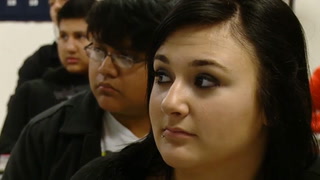
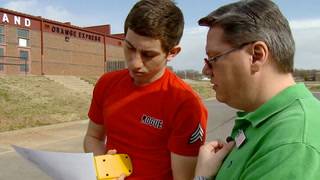
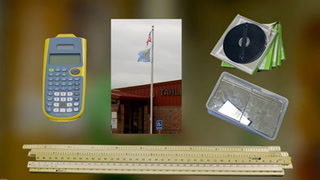
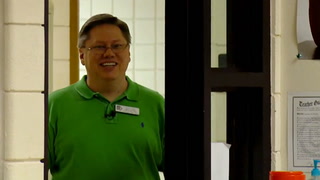
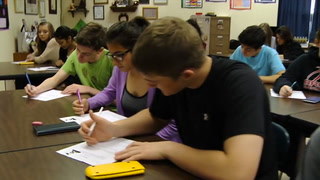
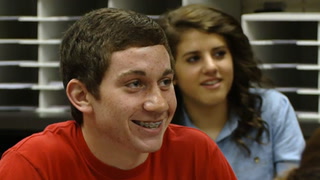








6 Comments
Alicia Self Sep 12, 2021 4:01pm
1. The topic of the video was how to use Common Core Standards to successfully teach a lesson on triangles in geometry.
2. A lesson that could be used in my classroom is including a mid-chapter assessment where the students have to explain their work to make sure they have a good understanding of the assignment.
3. I agree with what was said in this video because they talked about how they implemented their new lessons after they collaborated using Common Core Standards.
Katherine Chapp Mar 6, 2018 10:16am
Amy Powell Jan 28, 2016 7:30pm
Jen Abrams May 7, 2015 11:43am
Lydia Mabula Jan 17, 2015 2:18pm